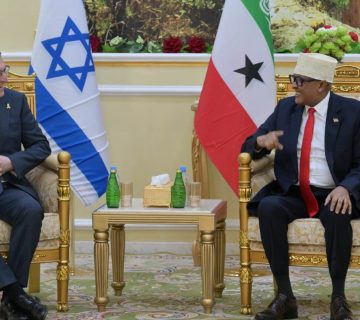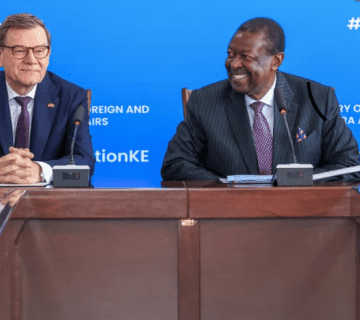Recent relations between Eritrea and Ethiopia have been characterized by rising tensions. Ethiopia’s ambition of gaining access to a naval port as well as Eritrea´s strategic location at the Red Sea are increasing the high threat perception by the Eritrean government. The outbreak of another conflict would further destabilize the Horn region and undermine existing peace building efforts.
Eritrea‘s narrative characterizes itself as an advocator for peace, progress and stability in the region, but has been and is prevented from fulfilling its role. The narrative presents Eritrea as a recurring victim of strategic interests of especially western nations. As such, the Eritrean government sees itself as having a duty to maintain national unity and to preserve power without foreign interference in Eritrea. As a result, this narrative allows both the internal consolidation of power, as well as a certain flexibility in their foreign affairs.
Historical background
Modern day Eritrea was created through a decree by the Italian king Umberto I. in 1890 and remained until 1941 a colony of Italy. In accordance with the treatment of other former Italian colonies, a promise of self-governance after the end of the Second World War was made to the Eritrean People by the British military administration. Because of its location, Eritrea became a pivotal element of the Allies‘ war strategy, with especially the USA taking an interest in Eritrea. To maintain this advantage during the Cold War, the USA convinced the United Nations General Assembly (UNGA) to implement a federation between Eritrea and the Imperial Ethiopia, which was an ally of the USA. Despite the initial promise by the British Administration and the wish of the Eritrean people for self-governance, the USA was the decisive power. The federation between Eritrea and Ethiopia was founded in 1952. As Eritreans felt betrayed and mistreated by the Allied Powers, the principle of self-determination became the impetus for the Eritrean Liberation Movement and the Eritrean government in the following years.
According to the federal constitution, Eritrea should remain autonomous in its internal affairs with the Ethiopian Emperor as sovereign. Instead Ethiopia annexed Eritrea triggering the Eritrean War of Independence. Although the Ethiopian Derg-Government was more affiliated with the Soviet Union after 1974, the USA hesitated to support the Eritrean Troops in return. As a consequence, the Eritrean troops neither got the support of USA or the Soviet Union, as both superpowers were respectively more interested in cooperation with Ethiopia. The aforementioned events have greatly influenced Eritrea’s current foreign policy that includes non-reliance on foreign aid and a critical stance against foreign engagement in the region.
Following victory in 1991, Eritrea held in April 1993 a referendum on the future of the country leading to its independence. This referendum was monitored by the UN and different international actors, providing Eritrea a democratic image. It’s purpose also explicitly lied in substantiating the importance of the right of self-determination and the national unity of the people of Eritrea and presenting Eritrea as an advocator of a new age of sustainable peace and stability.
Current Self-Conception of Eritrea
In accordance with the self-perception of being a peaceful country, Eritrea tries to end the conflicts in neighbouring countries and bring stability to the region. Wars like the Ethio-Eritrean War from 1998 to 2000 are seen as an action by old-minded individuals, which have been fueled by anti-Eritrean forces. The involvement of Eritrean troops in the Tigray-Conflict is rationalized by the danger that Tigary nationalism could mean for the national unity of Eritrea, and not as an act of war.
Eritrea considers the West as a great disturber of the peace and stability building process in the region. Especially the USA is seen as a continuous and general enemy of the Eritrean people. Taking this into account, the government of Eritrea takes a cautious stance towards development aid. In the Eritrean argumentation, development aid would allow foreign influence and the undermining of the local governments. Due to this, development aid in any form has to stand under national ownership in order to be regulated by the Eritrean government. However, according to the Bertelsmann Transformation Index (BTI), Eritrea remains one of poorest countries in the world. Therefore, while the Eritrean government is cautious of the work done by international organizations influenced by western values, they have to accept cooperation in order to receive essential developmental support. Consequently, Eritrea is welcoming the rise of the Global South and the prospect of the end of US-hegemony as a new world order may reduce the impact of the West on international organizations.
Overal, the Eritrean narrative characterizes the state as a victim of demonization through lies told by the West, especially in regard to the Eritrean National Service (ENS). In the eyes of the Eritrean government, the purpose of the ENS lies in safeguarding the territorial integrity and sovereignty of Eritrea. Also, it helps to ensure unity among the Eritrean people. Therefore, accusations by foreign nations are seen as a means to pursue foreign interests in Eritrea and to undermine this unity.
Way forward
Eritrea has created itself a narrative, which domestically explains the underdevelopment within the state and the actions of Eritrea in international politics as a consequence of the victimization of the country. The West is confirming this narrative by punishing Eritrea on the grounds of moral and value-based reasons.
Meanwhile, Eritrea is an important actor bordering the Red Sea and has a big impact on the stability of the Horn region. If the West chooses to insist on its current stance, other actors will benefit instead and increase their influence. This would have a long-term negative impact on western ambitions and interests in the Horn region.
On the other side, the western nations can put their geopolitical interests above a value-centered policy. The history between Eritrea and Ethiopia has shown, that Eritrea is able to change its national narrative and to work together with its former enemies. Therefore, the western nations can offer cooperation to Eritrea in areas of mutual interest and relate as equal partners to rebuild confidence, which would make the restoration of relations possible.
Jakob Dehner is a Research Intern at the Horn Institute.
Photo Credits: REUTERS/Tiksa Negeri



